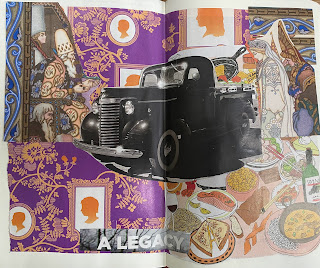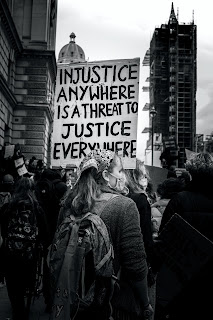Day 75 - Racism and one Nuyorican family, pt. 2
 |
| Photo by Ana Toledo on Unsplash |
Growing up in San Francisco in the 1970s, there was a strong feeling of Black pride and Black power palpable – even as it was largely demonized in mainstream media. The Black Panther movement was alive and well in the Bay Area, particularly as the Black Panther party had been founded in the late 60s in Oakland. The African American population in SF was 14% in the 1970s, and my family and I (my parents were separated and so it was only my mother and I) attended a predominantly Black Evangelical Pentecostal church – which meant, I went to church on Wednesday nights, Friday nights, and all day Sunday.
I grew up in a family of Nuyoricans, all my grandparents came to the mainland US from Puerto Rico in their late teens and early 20s. My parents and my brother and I were all born in New York City. We are part of a large Puerto Rican diaspora in New York City. My mother was one of 4 children, and my father was one of 5 children (both of their fathers likely had other families). Colorism within Latin families is gaining more acknowledgement (see the Adames, Chavez-Dueñas, & Jernigan, 2021) – not knowing either of my grandfathers I don’t know where they stood on topic, but I do know that each of my grandparents were lighter skinned, than many of their siblings or siblings’ partners.
Despite my mother’s mother being largely prejudice, my maternal aunt and maternal uncle both married African Americans and many of my first cousins are Black. My maternal grandmother’s history of colorism is not an uncommon story (neither are the stories of multiple families within one family). My grandmother’s mother died when she was quite young, and her father married a woman who was much darker than my mother’s mother. There was quite a range of skin color within my grandmother’s family – and my grandmother was always conscious of skin tone and European features growing up, working to play up her lighter skin color and less African features. This led to many instances and stories of racism within my grandmother’s family, and to criticism by my grandmother of her children’s Black partners.
In this regard, because my father had “light eyes” and lighter skin, he was considered a “better” catch. After all, he could pass as a White man. If you didn’t know he was Puerto Rican, it wasn’t obvious from the way he spoke, dressed, acted. As a career military man, he felt he had “pulled himself up by the bootstraps” and that anyone could. He was staunchly conservative. Between his encouragement to become somebody and being made to feel by my grandmother (and the society at large) that I had more opportunities because of my lighter skin, I think I have often internalized a sense of racism as described by the APA.
These are some beginning thoughts as I think back on the enduring, insidious, and pervasive nature of racism in my own family growing up. I am trying to “take a close, hard look at myself” as encouraged by Hook and colleagues (2017) – see day 73.
Adames, H. Y., Chavez-Dueñas, N. Y., & Jernigan, M. M. (2021). The fallacy of a raceless Latinidad: Action guidelines for centering Blackness in Latinx psychology. Journal of Latinx Psychology, 9(1), 26–44. https://doi-org.ezproxyles.flo.org/10.1037/lat0000179
American Psychological Association (APA). (2021, February). APA resolution on harnessing
psychology to combat racism: Adopting a uniform definition and understanding. https://www.apa.org/about/policy/resolution-combat-racism.pdf



Comments